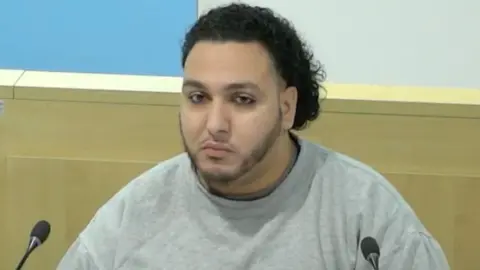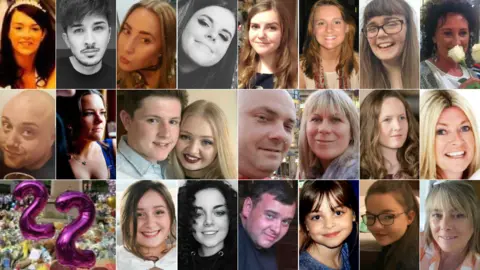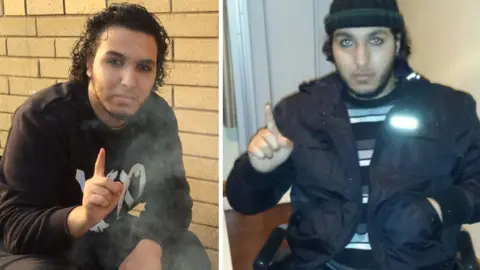Manchester Arena bomber's friend granted private parole hearing
 MAI
MAIA convicted terrorist who radicalised the Manchester Arena bomber has been granted a private hearing to decide if he can be released from prison.
Abdalraouf Abdallah, 30, was first jailed in 2016 for helping others go to Syria to join the Islamic State group.
He faces a Parole Board panel in April, which could result in him being freed on licence.
The BBC applied to have the hearing open to attend, but the Parole Board has rejected the application.
Abdallah was friends with Salman Abedi, whose suicide attack at the Manchester Arena on 22 May 2017 killed 22 people and injured hundreds of others.
Parole hearings are usually held in private, but since 2022 it has been possible to apply for them to held in public.
The BBC had argued an open hearing was in the public interest.
That stance is shared by Claire Booth, whose sister Kelly Brewster was killed in the bombing.
Following the Parole Board decision, she said those affected by the attack had "a right" to see and hear how the authorities deal with Abdallah.
 Family handouts
Family handoutsThe BBC's application argued there was an overwhelming public interest in there being public scrutiny, not just of Abdallah's application, but of the Parole Board process itself.
It said the public included many people directly affected by the Arena bombing, who should be afforded the opportunity to understand as much as possible about the evidence and the process.
However, submissions on behalf of the Secretary of State for Justice Alex Chalk argued there was insufficient reason for the hearing to be held in public.
Abdallah also opposed the hearing being heard in public.
Rejecting the BBC's application, Caroline Corby, chairwoman of the Parole Board for England and Wales, said the "high bar" for the hearing to be held in public had not been met.
She said matters relating to sensitive material may be significant to the panel's decision, and such material cannot be seen or discussed in public.
'He's not changed'
The Parole Board's decision document also stated that submissions on behalf of Mr Chalk said he was "concerned" for Abdallah's wellbeing and saw him as a "vulnerable person".
"It is the view of those involved in Mr Abdallah's management that a public hearing would place additional stress on him, undermining his ability to engage in the hearing," the document added.
Ms Booth, from Sheffield, survived the attack which killed her sister.
Responding to the Parole Board decision, she said the authorities saw victims of the attack as "a hassle" and wanted the case to go away.
"Abdallah is a convicted terrorist," she said.
"How can the public know he's safe unless the evidence is heard in public?
"In my opinion, he's not changed."
She added that victims of the attack were not contacted by the Parole Board or the government to let them know about the upcoming hearing.
This contrasts with one of the reasons given by the Parole Board for the hearing being in private, with Ms Corby saying in her decision that there were "concerns that a public hearing could cause distress to the victims of the Manchester Arena attack".

Abdallah, who moved to the UK as a child and grew up in south Manchester, was paralysed from the waist down while fighting in the Libyan revolution of 2011.
His trial heard that, from his wheelchair and mainly using a mobile phone, he arranged for the movement of money and fighters to Syria.
- In July 2016, he was given an extended sentence of more than nine years, comprising five years and six months in prison and a further four years on licence
- He was automatically released from custody in late 2020, with the Parole Board having no say, but was returned to prison in January 2021 after he breached his licence conditions
- He has remained in prison since, with his first Parole Board hearing due in April, ahead of his sentence expiring in November
In 2023, a public inquiry into the bombing formally concluded that Abdallah had played an "important role in radicalising" Salman Abedi.
It also found contact between the bomber and Abdallah, after the latter was imprisoned, "made a significant contribution to consolidating Salman Abedi's ideology as he was contemplating the attack, and stiffened his resolve to carry out the atrocity".
Abdallah used illicit mobile telephones in prison to communicate with Abedi, who also visited him there.
He was one of a small group of people found to have influenced Abedi's world view.
Inquiry chairman Sir John Saunders said there was "insufficient evidence to enable me to conclude that Abdalraouf Abdallah had any prior knowledge of the attack".
He only gave evidence to the inquiry after considerable efforts were made to make him appear and had initially refused to answer questions or give evidence in case he incriminated himself.
When he gave evidence in November 2021, he condemned the Arena attack, denying any role in the bombing or knowing about it in advance.

Why not follow BBC Manchester on Facebook, X and Instagram? You can also send story ideas to [email protected]
